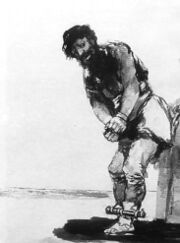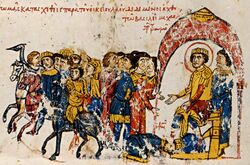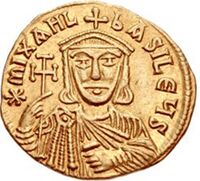Michael II
Rapid changes of fortune were a regular occurence in Byzantine history. This was certainly true for Michael II. In 820, he looked a total goner. A former friend and colleague of emperor Leo V, Michael had lost imperial favour when he tried to have Leo 'removed from power' over an obscure family dispute. The coup was insufficiently lethal and Leo ruled that Michael would be the one to die. However, Leo may have felt that joyous Yuletide was not the best season to kill an enemy, so he merely chained Michael up in a dungeon underneath the grand imperial palace in Constantinople with no presents at all under the tree. Leo had the only key to Michael's chains, so there appeared to be no danger of his erstwhile friend escaping. The emperor just needed to know who else was in the assassination plot.
Michael was able to pass a message to his fellow conspirators against Leo. To-wit: 'Release me from prison or I will spill the beans'. His 'friends' obliged and stabbed Leo to death inside a chapel. They went to the dungeon and released Michael. However, they had killed the emperor before finding out where he stashed the keys to the manacles, so Michael was enthroned, still in metal accoutrements. So began a new dynasty to rule over the Byzantine Empire. First task: to find a competent blacksmith.
Background[edit]
Michael was a native of Amorium, the main city of Phyrgia on the frontier with the Abbasid Empire.[1] Michael had joined the army and along the way had become a great friend of Leo V. He was involved in the deposition of his namesake emperor Michael I in 813 and appeared to be a trusted friend of Leo. But they had fallen out, apparently over Leo divorcing his first wife. She was related to Michael, who took offence and gathered other malconents to kill Leo. This wasn't about faction, as both Michael and Leo were iconoclasts.
Michael was about 50 when he became emperor, known in the realm as 'Michael the Stammerer'.[2] A voice coach might have improve this speech impediment (see The Emperor's Speech if you like), but much like Joe Biden, he bulled ahead without coaching — and still wearing those manacles, whereas Biden only had sunglasses and a face mask. Michael did not seem to be an impressive candidate for the throne of the Caesars, and one of his former friends who shared this low opinion of him was Thomas the Slav. A civil war was on!
Rebellion[edit]
Thomas the Slav had been a close friend and boon companion of both Leo and Michael, well rewarded by Leo with eastern provinces to control. But after Leo's brutal death, Thomas began saying that Michael had 'stolen the throne'. Thomas proclaimed himself as emperor and went to war. He soon gathered an impressive coalition including 'Never Mikeys', anti-Iconoclastic Christians, heretics and Muslim Arab volunteers from the Abbasid Caliphate.
The revolt quickly grew. Michael's armies were beaten and soon Thomas was knocking on the door of Constantinople. Michael looked around for allies but no one was willing to help. As ever, it is precarious to clamber to power over the literal dead body of a predecessor. That Michael's mates had killed Leo in a Christian place of worship was an equally poor look. Michael seemed doomed, but then he remembered the Bulgarians. Michael correctly adjudged that a few more shiny bribes would persuade their leader Khan Omurtag to attack. A Bulgarian army snuck up on Thomas's army from the rear. Accounts differ about the outcome of the battle, but Thomas evidently gave up besieging Constantinople. Instead, he fortified a position in nearby Thrace and still held territory in the eastern provinces.
The civil war dragged on until 824. Michael's armies surrounded Thomas's fortifications and starved them out. Thomas was betrayed by his own troops (hoping for pardons). Considering the damage done to the Byzantine Empire, Thomas could expect no mercy. Instead, he tried delaying his fate by suggesting he had a 'hoard of evidence' claiming that Michael's own soldiers were going to betray him. The emperor hesitated until one of his generals dismissed Thomas's claims as fake information. Thomas got his hands cut off. Seated backwards on a jackass, Thomas was paraded around until he fell off his mount.[3] Then his head was cut off. This, relative to contemporary ex-emperors and rebels, was a merciful end.
Iconoclasm and a new wife[edit]
Michael's initial imperial moves were baffling. Though Emperor Leo had reversed the Eastern Orthodox Church's position on image veneration (worship to Iconoclasts), Michael re-heated the iconoclasm issue yet again. This was self-defeating during a war, but Michael may have seen it as a distraction to Thomas's rebellion and a way to weaken his hold in the iconoclast East.
In 823, Michael's wife Thekla died, leaving him with a 22-year-old son Theophilos and a daughter Helena.[4] Theophilos was created Junior Emperor (Caesar Minor) to help him get over losing his mother. Helena was to be married off or sent to a nunnery, depending on the emperor's wishes.
Michael now forged a marital link to the Isaurian dynasty by marrying Euphrosyne, the daughter of Constantine VI. She had been shut away as a nun since the age of five, when her father had divorced her mother to marry his mistress. Euphrosyne's conversion from a bride of Christ to a wife of a regicide raised quite a few ecclasiastical eyebrows. At Michael too; being a party to a murder in a church wasn't as bad as marrying an ex-nun. Considering Euphrosyne's religious sheltering, it is unlikely the marriage was ever consummated.
Losing more territories[edit]
In the early 9th century, the Byzantines still held islands like Sardinia, Corsica, Sicily and Malta, thanks to their fleet (and the secret weapon of Greek Fire). The Byzantines viewed the chief threat as the re-established Roman Empire in the West — better known as the Holy Roman Empire — and its ally, the Papacy. However, the Arabs of Tunisia proved to be the greater problem.
In 827, a sacked Byzantine commander called Euphemius invaded Sicily with an Arabian army to restore his power. His troops soon sidelined him (a dagger to the vitals helped that bit along) and established a Muslim bridgehead on the island. Byzantine attempts to counter this failed. This in turn weakened Byzantine control of Corsica and Sardinia, which went off on in their own directions. Michael's hope of a quick recovery were upturned when a Muslim fleet captured Crete. The Muslims would hold on to Crete for 140 years, and to Sicily until the 11th century. Michael's inability to reverse these losses was often attributed to God's ire with Byzantine religious policy — by contemporary writers who, as image worshippers, were equally irate.
Death[edit]
Michael died in 829. Following a less-than-legal ascension to power, random domestic initiatives, and disastrous foreign initiatives, he scored his greatest career achievement: giving up the throne from natural causes, as opposed to the overthrow and/or disfigurement and/or murder that had been the Empire's usual procedure through the preceding half-century.
References[edit]
- ↑ Also known as Amorion.
- ↑ I expect no one was stupid enough to call him that to his face
- ↑ The treatment of Thomas is very similar to what happened to an earlier imperial usurper a few centuries back. Check the fate of Ioannes
- ↑ Her birth date is unknown, recording the birth dates of women by chroniclers was an optional extra.
| Preceded by: Leo V |
Byzantine Emperor 820–829 |
Succeeded by: Theophilos |





